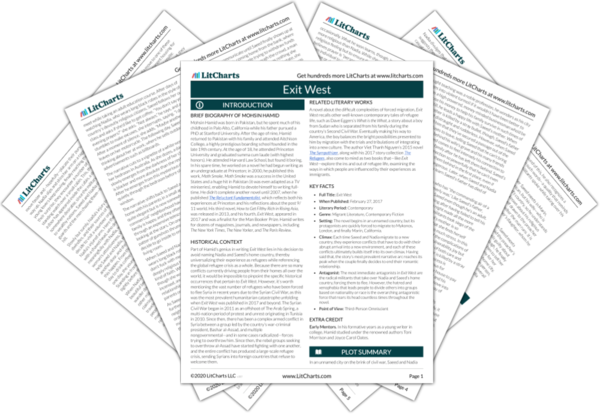Saeed’s Mother Quotes in Exit West
It was the sort of view that might command a slight premium during gentler, more prosperous times, but would be most undesirable in times of conflict, when it would be squarely in the path of heavy machine-gun and rocket fire as fighters advanced into this part of town: a view like staring down the barrel of a rifle. Location, location, location, the realtors say. Geography is destiny, respond the historians.
Saeed’s father encountered each day objects that had belonged to his wife and so would sweep his consciousness out of the current others referred to as the present, a photograph or an earring or a particular shawl worn on a particular occasion, and Nadia encountered each day objects that took her into Saeed’s past, a book or a music collection or a sticker on the inside of a drawer, and evoked emotions from her own childhood, and jagged musings on the fate of her parents and her sister, and Saeed, for his part, was inhabiting a chamber that had been his only briefly, years ago, when relatives from afar or abroad used to come to visit, and being billeted here again conjured up for him echoes of a better era, and so in these several ways these three people sharing this one apartment splashed and intersected with each other across varied and multiple streams of time.
[I]t was an easy promise to make because she had at that time no thoughts of leaving Saeed, but it was also a difficult one because in making it she felt she was abandoning the old man, and even if he did have his siblings and his cousins, and might now go live with them or have them come live with him, they could not protect him as Saeed and Nadia could, and so by making the promise he demanded she make she was in a sense killing him, but that is the way of things, for when we migrate, we murder from our lives those we leave behind.

Saeed’s Mother Quotes in Exit West
It was the sort of view that might command a slight premium during gentler, more prosperous times, but would be most undesirable in times of conflict, when it would be squarely in the path of heavy machine-gun and rocket fire as fighters advanced into this part of town: a view like staring down the barrel of a rifle. Location, location, location, the realtors say. Geography is destiny, respond the historians.
Saeed’s father encountered each day objects that had belonged to his wife and so would sweep his consciousness out of the current others referred to as the present, a photograph or an earring or a particular shawl worn on a particular occasion, and Nadia encountered each day objects that took her into Saeed’s past, a book or a music collection or a sticker on the inside of a drawer, and evoked emotions from her own childhood, and jagged musings on the fate of her parents and her sister, and Saeed, for his part, was inhabiting a chamber that had been his only briefly, years ago, when relatives from afar or abroad used to come to visit, and being billeted here again conjured up for him echoes of a better era, and so in these several ways these three people sharing this one apartment splashed and intersected with each other across varied and multiple streams of time.
[I]t was an easy promise to make because she had at that time no thoughts of leaving Saeed, but it was also a difficult one because in making it she felt she was abandoning the old man, and even if he did have his siblings and his cousins, and might now go live with them or have them come live with him, they could not protect him as Saeed and Nadia could, and so by making the promise he demanded she make she was in a sense killing him, but that is the way of things, for when we migrate, we murder from our lives those we leave behind.











